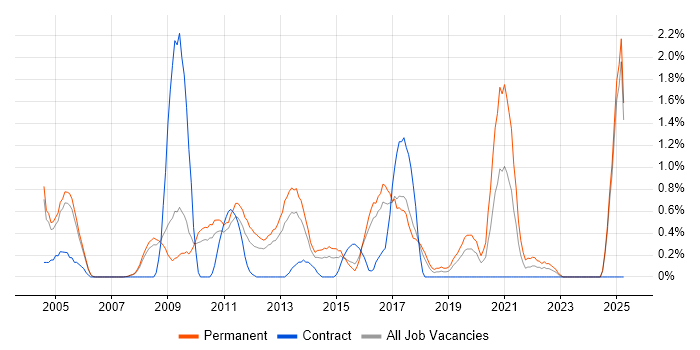Data Mining
Berkshire > Slough
The table below provides summary statistics and salary benchmarking for jobs advertised in Slough requiring Data Mining skills. It covers permanent job vacancies from the 6 months leading up to 26 February 2026, with comparisons to the same periods in the previous two years.
| 6 months to 26 Feb 2026 |
Same period 2025 | Same period 2024 | |
|---|---|---|---|
| Rank | 41 | - | - |
| Rank change year-on-year | - | - | - |
| Permanent jobs citing Data Mining | 2 | 0 | 0 |
| As % of all permanent jobs in Slough | 0.66% | - | - |
| As % of the Database & Business Intelligence category | 4.65% | - | - |
| Number of salaries quoted | 1 | 0 | 0 |
| 10th Percentile | - | - | - |
| 25th Percentile | £35,000 | - | - |
| Median annual salary (50th Percentile) | £40,000 | - | - |
| 75th Percentile | £45,000 | - | - |
| 90th Percentile | - | - | - |
| Berkshire median annual salary | £50,000 | - | - |
All Database & Business Intelligence Skills
Slough
Data Mining falls under the Databases and Business Intelligence category. For comparison with the information above, the following table provides summary statistics for all permanent job vacancies requiring database or business intelligence skills in Slough.
| Permanent vacancies with a requirement for database or business intelligence skills | 43 | 44 | 45 |
| As % of all permanent jobs advertised in Slough | 14.14% | 33.08% | 30.00% |
| Number of salaries quoted | 31 | 30 | 35 |
| 10th Percentile | £63,750 | £41,250 | £41,200 |
| 25th Percentile | £65,000 | £60,000 | £48,750 |
| Median annual salary (50th Percentile) | £70,000 | £66,250 | £67,500 |
| Median % change year-on-year | +5.66% | -1.85% | - |
| 75th Percentile | £75,000 | £71,250 | £71,250 |
| 90th Percentile | - | - | - |
| Berkshire median annual salary | £60,000 | £70,000 | £67,500 |
| % change year-on-year | -14.29% | +3.70% | +12.50% |
Data Mining
Job Vacancy Trend in Slough
Historical trend showing the proportion of permanent IT job postings citing Data Mining relative to all permanent IT jobs advertised in Slough.

Data Mining
Salary Trend in Slough
Salary distribution trend for jobs in Slough citing Data Mining.

Data Mining
Co-Occurring Skills & Capabilities in Slough by Category
The following tables expand on the one above by listing co-occurrences grouped by category. They cover the same employment type, locality and period, with up to 20 co-occurrences shown in each category:
